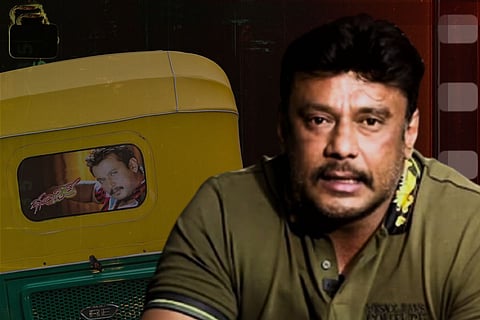Fanpower, masculinity & crime: How Kannada superstar Darshan became prisoner no 6106
In February 2011, the papers and channels in Karnataka were abuzz with the news of Kannada superstar Darshan’s arrest. The allegations against him were severe — that he battered his wife and threatened to murder their toddler. At the barber shop where Swami worked, however, all anybody could talk about was Darshan’s latest film, Saarathi.
For 14-year-old Swami who lived in a small town in Mysuru district, watching Saarathi and seeing Darshan on the big screen was a revelation. He was captivated by his performance as Raja, an autorickshaw driver who was torn apart from his birth family by his uncle, who was also responsible for his father’s death. In the film, Raja avenges his father’s death, reclaims his rightful place in a well-off family, and wins the woman.
Swami and his friends were not the only ones in thrall; Saarathi went on to become a runaway hit.
In the years that came after, Swami religiously followed the actor’s career and troubles with the law. Even as controversies piled up, his admiration only grew stronger. “When Darshan was released from jail, I felt immense relief,” Swamy, who is now 27, recalled.
When Darshan entered the Kannada film industry 27 years ago, he was a little-known figure despite being the son of an actor. After achieving a measure of success, he often gave media interviews in which he talked about his troubles because of his father’s illness. That was when fans began to call Darshan the ‘Challenging Star’ — the underdog who won. Eventually, these fans gave him another name: ‘D-Boss’, and began to refer to themselves as the ‘D-Army’. This ‘Army’ has since stood steadfastly behind him, even through allegations of domestic violence and murder.
Swami said that by the time Darshan’s Jaggu Dada was released in 2016, he had even styled his hair and beard like him. “I also connected with other D-Boss fans, and I’m often mistaken for D-Boss himself,” he said.
Swami has since completed his SSLC, and now owns a barber shop. In the past eight years, he has developed an Instagram presence with over 33,000 followers. He religiously posts videos of himself re-enacting iconic songs and dialogues from Darshan’s films.
Thirteen years after Swami first saw him on screen, Darshan is now back in jail. This time, he is accused of conspiring to murder, 33-year-old Renukaswamy, a pharmacist from Chitradurga.
But the murder allegations haven’t shaken Swami’s loyalty to his idol. “I don’t believe D-Boss could ever intentionally harm anyone. Even if mistakes were made, they must have been by accident. Imagine someone sending inappropriate photos to your loved ones — what would you do?” he asked.

